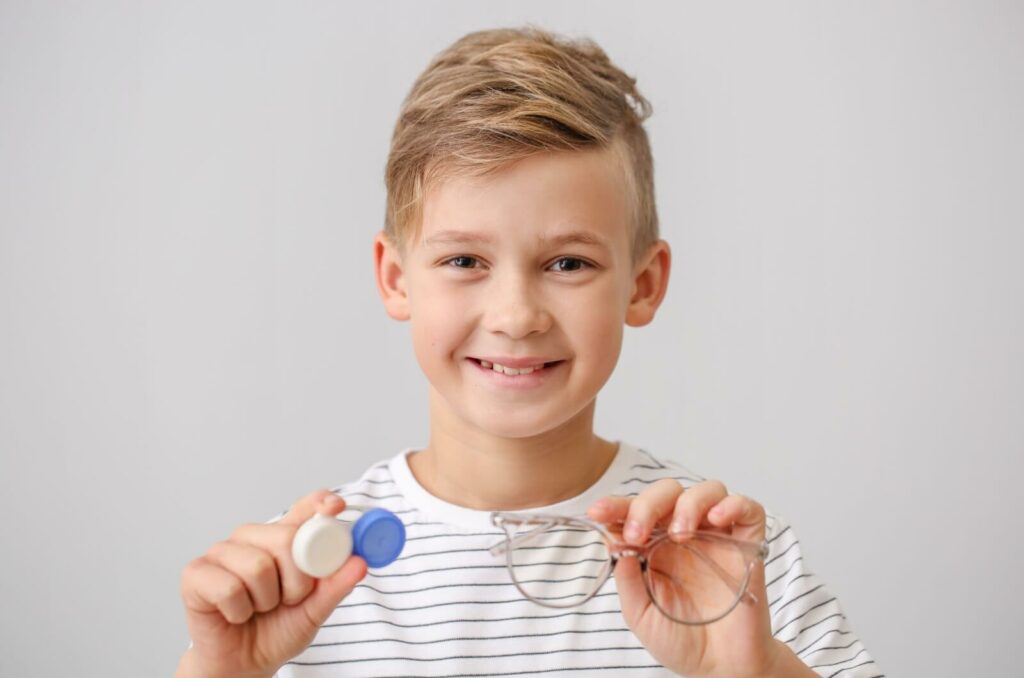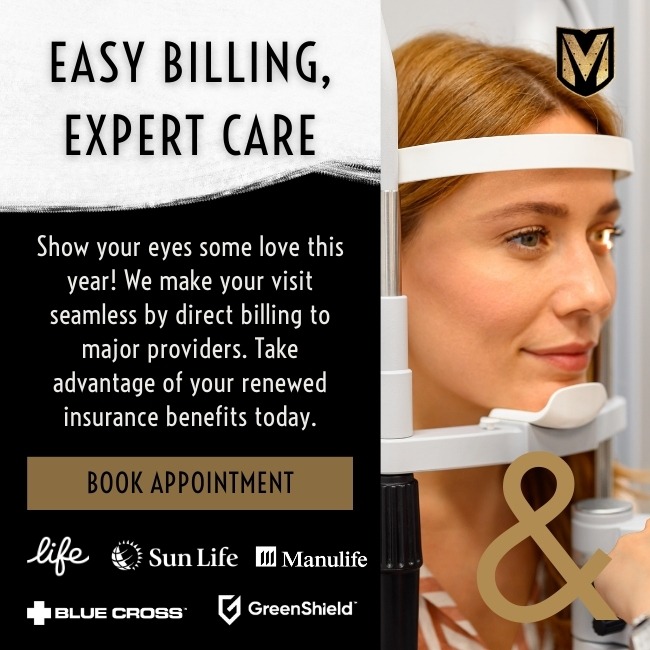Do you find it hard to see things that are far away? You might be one of the millions dealing with myopia, an increasingly common condition that we more often call nearsightedness.
Myopia allows you to see things up close, but makes distant objects look blurry. It can have a significant effect on your day-to-day life—whether you’re driving, watching a movie, or just trying to enjoy a beautiful view.
The good news? There are plenty of ways to correct myopia and get your vision back on track, like prescription glasses or contact lenses. Talking with an eye care professional can help you figure out the best option for your situation.
At Milton Vision & Sports Vision Training Centre, our optometrists are well-versed in correcting myopia. In particular, Dr. Curtis Akerman lectures nationally on myopia management and has performed myopia control for over 20 years, including fitting orthokeratology lenses and managing spectacle, soft contact lens and atropine patients. Your vision will be in good hands.
What Is Myopia?
Myopia occurs when the eyeball is too long or the cornea is too curved. This causes light entering the eye to focus in front of the retina instead of directly on it. The result? Distant objects look blurry, while close-up objects remain clear.
Symptoms & Causes of Myopia
Common symptoms of myopia include:
- Squinting
- Eye strain
- Headaches
- Difficulty seeing distant objects clearly
Genetics also play a significant role. If your parents are nearsighted, there’s a good chance you might be too. Environmental factors like prolonged close-up tasks (e.g., reading or screen time) can also contribute to the condition.
Diagnosing Myopia
An eye exam conducted by an optometrist can diagnose myopia. The test usually includes:
- A visual acuity test
- A refraction assessment
- An eye health evaluation
Early diagnosis is essential for effective management.
Glasses for Myopia
Glasses are a tried-and-true method for correcting myopia. Glasses use concave lenses to diverge light before it enters the eye, ensuring that it focuses directly on the retina. This adjustment helps you see distant objects more clearly.
Types of Glasses Lenses for Myopia
There are several types of lenses available for myopia correction:
- Single Vision Lenses: These lenses have the same optical power throughout and are designed to correct distance vision.
- High-Index Lenses: Thinner and lighter than regular lenses, high-index lenses are ideal for those with stronger prescriptions. They offer better aesthetics and comfort.
- Bifocal and Progressive Lenses: While primarily used for presbyopia, these lenses can also be customized to correct myopia and provide multifocal vision.
Glasses are easy to use, require minimal maintenance, and can be stylish accessories. They also provide additional eye protection from dust and debris.
MiYOSMART Glasses
MiYOSMART is a kind of dual-focus glasses lens that uses Defocus Incorporated Multiple Segments (DIMS) technology to help manage myopia in children. These lenses alternate between areas of focus and defocus in a way that both corrects for vision and reduces elongation of the eye, thereby slowing the progression of myopia.
Several studies have shown that MiYOSMART lenses both are effective and have long-term beneficial effects if worn consistently for years.
Contact Lenses for Myopia

Contact lenses offer a wide field of vision and are excellent for active lifestyles. They eliminate the discomfort of glasses slipping down your nose or fogging up in cold weather.
Types of Contact Lenses for Myopia
There are various contact lens options for correcting myopia:
- Daily Disposable Lenses: Convenient and hygienic, these lenses are discarded after a single use.
- Extended Wear Lenses: Designed for continuous use, some extended wear lenses can be worn overnight. However, they require diligent cleaning to prevent eye infections.
Always follow your optometrist’s instructions for cleaning and replacing your lenses. Regularly attend follow-up appointments to ensure your prescription remains accurate and your eyes stay healthy.
Ortho-K Lenses Correct Myopia While You Sleep
Orthokeratology (Ortho-K) involves wearing specially designed contact lenses overnight to temporarily reshape the cornea. This non-surgical method provides clear vision during the day without the need for glasses or contacts.
How Ortho-K Lenses Work
Ortho-K lenses gently mold the cornea while you sleep. When the lenses are removed in the morning, the cornea retains its new shape, allowing light to focus correctly on the retina. The effect typically lasts for a day, and requires nightly use for consistent results.
Advantages of Ortho-K
Ortho-K is ideal for active people who prefer not to wear glasses or contact lenses during the day. It’s also a good option for children, as it may help slow the progression of myopia.
MiSight Contact Lenses
MiSight contact lenses are a kind of daily disposable lens that slows the progression of myopia in children. In other words, MiSight lenses not only correct for myopia, but they also prevent the condition from getting worse, thereby preserving a child’s future vision.
MiSight lenses are a type of “dual-focus” lens, meaning that they have two different focal areas—one for distance, and one for near vision. Dual-focus lenses slow myopia progression by signalling the eye to stop growing so that the eyeball doesn’t become too long.
Choosing the Right Lens for Your Lifestyle
Each corrective method has its own pros and cons.
- Glasses are low-maintenance, but can be cumbersome during physical activities.
- Contact lenses offer convenience but require diligent care.
- Ortho-K provides daytime freedom from corrective lenses but requires a commitment to wearing them overnight.
When choosing a corrective method, consider your daily activities, comfort, budget, and personal preferences. Discussing these factors with your optometrist can help you make an informed decision.
Remember, what’s best for one person might not be ideal for another. Tailor your choice to fit your lifestyle and vision needs.
Long-Term Management of Myopia
Ongoing Care & Adjustments
Managing myopia is a continuous process. Regular eye exams and adjustments to your corrective lenses are essential for maintaining clear vision over time.
At Milton Vision & Sports Vision Training Centre, our doctors also use Biometer to measure changes in the length of the eye to more accurately measure and predict changes in myopia.
Staying Informed About Advances
Stay updated on the latest advancements in myopia correction. New technologies and treatments are constantly emerging, offering improved solutions for better vision.
Taking Action for Better Vision
Understanding and managing myopia is crucial for maintaining clear vision and overall eye health. Whether you choose glasses, contact lenses, or Ortho-K, professional guidance and regular care are essential for optimal results.
Ready to take control of your vision? Book an appointment with Milton Vision & Sports Vision Training Centre and discover the best corrective options for you.



